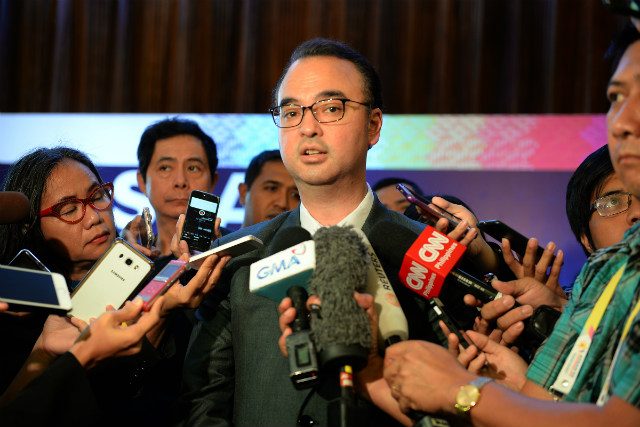SUMMARY
This is AI generated summarization, which may have errors. For context, always refer to the full article.

MANILA, Philippines – Philippine Foreign Secretary Alan Peter Cayetano downplayed the 2016 arbitral award won by the Philippines against China, and said it is enough to cite a 1982 convention in statements about the South China Sea dispute.
Cayetano said the Philippines’ arbitral award in 2016 also refers to the 1982 United Nations Convention on the Law of the Sea (UNCLOS), the so-called constitution for the oceans.
He addressed these remarks to “the people who keep saying, ‘arbitral award,’ ‘arbitral award,'” in apparent reference to critics who stress the need to cite the Hague ruling on the South China Sea or West Philippine Sea.
“Ano ba ang arbitral award? Hindi ba UNCLOS ‘yun, 1982? O, eh lahat naman ng statement may UNCLOS 1982 eh,” Cayetano said on Tuesday, November 21, in an interview on ANC’s Headstart with Karen Davila.
(What is the arbitral award? Isn’t that UNCLOS 1982? But all statements contain UNCLOS 1982.)
This is a half-truth, however, because while the Philippines’ case against China was based on UNCLOS, this is not equivalent to the law of the sea convention.
In fact, even before Manila won its case against Beijing, the Philippines and the Association of Southeast Asian Nations (ASEAN) have cited UNCLOS in their statements on the South China Sea.
The Hague ruling of July 12, 2016, was a new element that has never made its way into any ASEAN statement.
‘Wording’ without legal effect?
To drive home his point, Cayetano on Tuesday compared the situation to telling a person that he or she is ugly.
“Sabihin mo na sa akin na may wrinkles na ako, manipis na buhok ko, ‘di ba, okay sa akin. Pero sabihin mo in public na pangit ako, huwag naman,” Cayetano said.
(You can tell me I have wrinkles, I have thinning hair, that’s okay with me. But tell me in public that I’m ugly, please don’t.)
He then said that citing the Hague ruling is “wording that does not have an effect” in the legal sphere.
Experts had hoped that ASEAN would rally around this ruling to tame an aggressive Beijing.
The Philippines could have pushed for a mention of the ruling during its ASEAN chairmanship, but the Duterte administration wasted this opportunity.
Still, Cayetano said on Tuesday that the Philippines “brought up the arbitration award” in its bilateral talks with China.
He did not specify in what way the award was brought up.
“We put it in the context that the President said. The President’s instruction is that at one point in his administration, he has to take this up to look at it, et cetera. But so that we can get to the next phase, we will just put it there, ‘di ba (right)? So it is in the records,” Cayetano said.
“But if ‘yung starting point pa lang, ‘O, usap tayo, o eto ‘yung award.’ Eh kung mag-walk out ‘yung kausap mo?” (But if the starting point is, “Okay, let’s talk, here is the award.” What if the party you’re talking to walks out?) – Rappler.com
Add a comment
How does this make you feel?
There are no comments yet. Add your comment to start the conversation.